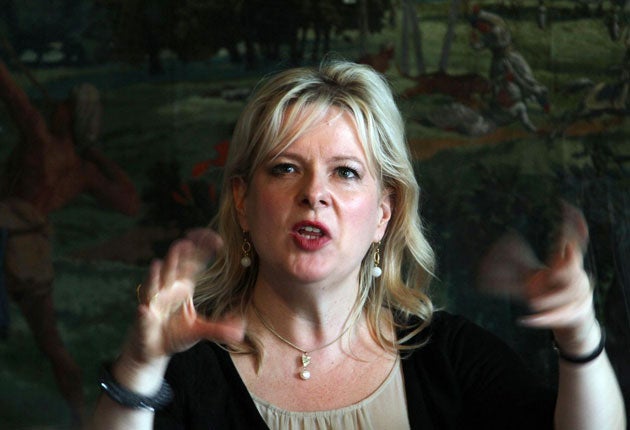Allison Pearson reveals agonies in writing her latest book
Best-selling author tells of how she was engulfed by 'bad clinical depression.'

Allison Pearson, the journalist-turned-bestselling author, yesterday spoke of the depression that engulfed her while writing her second novel and the anger she felt at her book being branded as "superior chick-lit".
She told the Independent columnist Christina Patterson on the final day of the Woodstock Literary Festival, that she "fell into a bad clinical depression" while writing I Think I Love You, about a teenager's obsessive crush on the 1970s pop star and pin-up, David Cassidy.
"I think something I do have in common with [her fiction's teenage protagonist] Petra's life is that, like a lot of little girls, when I was young I wanted to be perfect, and I worked really hard to be good at everything. So I thought I'd be able to put my foot on the accelerator and get myself out of a depression but it doesn't work."
Pearson, 50, spoke about her outrage at a review in The Spectator which called her writing a superior form of chick-lit. "I was very cross. If you come through the depression and you have fashioned every paragraph as beautifully as you can and killed yourself to do it, and then someone says its chick-lit, it's putting it in a box [suggesting that] only certain people would like it. It's very disdainful." Pearson said when she was 13, she had been infatuated with Cassidy but, meeting him decades later as a journalist, he told her the ardour of the "fan worship" from young girls had frightened him. "He said he was very scared a lot of the time. They would jump on his car. It's not an entirely sweet force."
Pearson also spoke about the accidental inspiration of her first novel, I Don't Know How She Does It, about working mothers having to juggle their lives, which has sold 3.5 million copies and is being adapted for a film starring Sarah Jessica Parker.
She spoke of the episode that inspired her first novel. "I was a mother and a journalist. My son was about five or six months old and he was ill, and I was sent to New York to interview three people back to back. I got home and I saw my baby. He had been very ill and he was on three kinds of antibiotics. I'd been away for eight days. I looked at him and thought 'What am I doing? I'm a terrible mother and a terrible journalist'. That week, I wrote a column in The London Evening Standard asking, 'How are you supposed to do this?' I wrote honestly about what had happened to me and hundreds of letters started coming in. It was like a furnace."
She decided to write fiction, rather than tell the real-life stories of women struggling to be working mothers and wives, because "if I had written a book saying, 'Ladies, your life is terrible' I would have sold three copies. It's always better to laugh people into recognition."
Elsewhere at Woodstock, literature lovers lapped up talks by writers including David Starkey, Sir Max Hastings, and Lady Antonia Fraser. The debut novelist, Daisy Goodwin, spoke to The Independent's editor-in-chief, Simon Kelner, about her book, The Last Duchess, and her tenure as chair of the Orange Prize for women's fiction.
She said her observations of book-prize jurors who were also novelists, particularly if they are not successful, was that they tended not to select novelists in their own genre for book-prize shortlists.
Highlights
In their own words: festival's leading voices
Richard Dawkins: 'Nobody who disagrees ever comes to my lectures – or if they do, they keep very quiet afterwards.' - Talking about the reception he gets travelling in the US's Bible Belt
Robert Fisk: 'Television does not show the hideous realities of war: the bodies torn apart and eaten by dogs, the torsos of babies. Viewers believe in the idea of a bloodless war.' - The Independent's foreign correspondent, on war reporting
Steven Berkoff: 'I knew I wanted to be a tailor if I had the skills, but my father didn't teach me. It would have been much nicer to be a tailor than an actor. In a way, play-writing is like tailoring, it's like making a suit of words.' - The actor and director on his early life
Howard Jacobson
'I feel that being morbid is a part of being a novelist. People who feel life is fragile and tenuous, that's what sends people into the writing business. If you don't feel that sense of fragility, they are more like David Beckham, who just gets on with it.' - The Independent columnist and author, shortlisted for this year's Man Booker Prize
Subscribe to Independent Premium to bookmark this article
Want to bookmark your favourite articles and stories to read or reference later? Start your Independent Premium subscription today.

Join our commenting forum
Join thought-provoking conversations, follow other Independent readers and see their replies